China has seen a growth in high-tech greenhouses in the last few years. The demand for innovative technology is becoming widespread. Chinese companies are looking for automated solutions, whether in terms of plantation or management, and they often turn their attention to the Netherlands.
The Wageningen University Alumni Chapter China responded to this trend with an online symposium on horticultural installations. The symposium took place on August 13. The symposium introduced Chinese followers to different technologies and management concepts in the Dutch horticultural industry.
Denise Spiekerman, spokesperson for Chinese activities at the Wageningen University Alumni Office, opened the online symposium: "The outbreak of Covid-19 has slowed down cooperation between Chinese and Dutch horticultural companies. Many exchange visits have been canceled and planned projects have been delayed. We hope to provide a platform for continued cooperation during this pandemic. We hope that participants from the horticultural industry will be able to strengthen connections, advance cooperation, and promote development in the Chinese horticultural industry, even under these difficult circumstances."
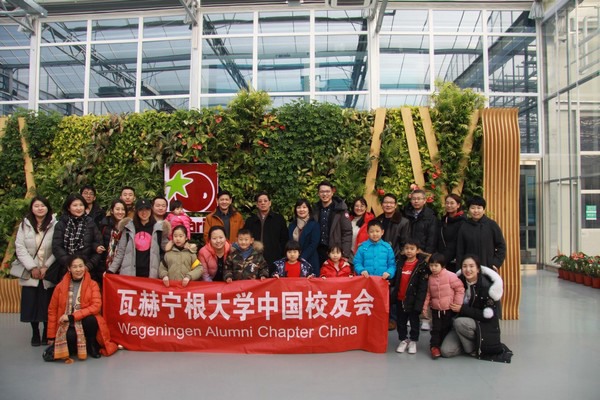
Honored guests at the symposium included Dr. Yang Qizhang, Director of the Institute of Urban Agriculture at the Chinese Academy of Agricultural Sciences, Dr. Huang Ruiqing, chairman of the board at Ruixue Global, Dr. Xu Dan, CEO at HortiPolaris, and Dr. Qiu Yutong, a specialist in sustainable insect pest management at the Plant Sciences Group at Wageningen University. These honored guests shared their years of experience in the horticultural industry and their views on the Chinese horticultural industry with the symposium participants. All four speakers are alumni of Wagening University, and enthusiastically encourage the exchange of horticultural technology between the Netherlands and China.
Dr. Yang Qizhang, Director of the Institute of Urban Agriculture, was the first to give a speech. Director Yang stated that horticultural installations are implemented on a growing scale, but the vast majority of horticultural companies in China still use small-scale facilities with a low level of mechanization, which results in low yields and low efficiency. The Chinese government has therefore supported investment in the horticultural industry in the last few years.
Key trends in future developments include industrial scaling, mechanization, improvements in production volume and product quality, and training of highly-qualified personnel. In addition, the development of botanical factories is incredibly swift in China. The scale continues to expand. Chinese consumers have a growing demand for clean, fresh vegetables. In response to this trend, botanical factories expand the scale of vegetable production, and they move a number of botanical installations into urban environments such as communal plots and private homes.
Furthermore, the Chinese horticultural industry is rapidly growing. There is an increasing need for highly-qualified personnel. There are many difficulties with horticultural science and with the practical application of solutions during the production process. Horticultural companies have to invest in cooperation with educational institutions to train the next generation of horticultural specialists.
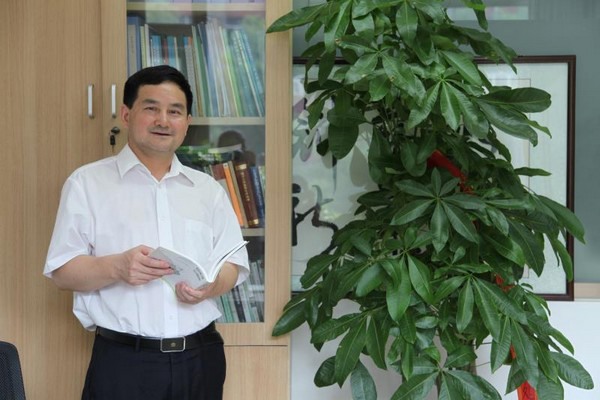
Dr. Yang Qizhang, Director of the Institute of Urban Agriculture at the Chinese Academy of Agricultural Science
Following the first speech, Dr. Huang Ruiqing, chairman of the board at Ruixue Global, introduced the audience to current applications of Dutch greenhouse systems in China, as well as future developments in the industry. Ruixue Global was one of the first comprehensive horticultural suppliers in China. The company creates a bridge between Dutch technology and Chinese horticultural industry.
Ruixue Global provides custom-made greenhouse solutions for Chinese companies. Dr. Huang used concrete examples to contrast the Chinese and Dutch horticultural industries and explained why Chinese companies need to pay attention to "four changes": specialization (in-depth understanding of a particular plant/product), scaling (large scale greenhouse production can safeguard against investment risks), standardization (products need to meet high, uniform standards), and marketization (top-quality products from greenhouses require more refined marketing channels).
At the same time, Dr. Huang also emphasized the importance of qualified personnel for developments in the Chinese horticultural industry. Specialists with practical experience form the backbone of the Chinese horticultural industry.
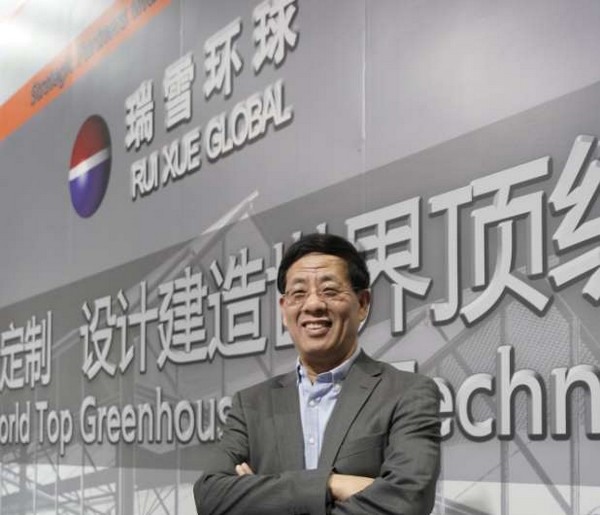
Dr. Huang Ruiqing, chairman of the board at Ruixue Global
The third speaker was Dr. Xu Dan, CEO at HortiPolaris. The plantation of HortiPolaris consists of a series of interconnected glasshouses covering an area of 3.3 hectare. The Chengjian Group invested 150 million yuan [21 million USD] to make the construction of this plantation possible.
The HortiPolaris plantation already reached a steady production volume of 500 tons of cherry tomatoes and 100 tons of leaf vegetables. This production capacity broke the previous record of highest production volume per square meter (cherry tomatoes 31kg/m2, leaf vegetables 60-80kg/m2).
HortiPolaris also facilitated the localization process for technology teams, large scale application of plantation, product standardization, sustainable supplies, and a level of food safety that is on par with European standards. After a trial period in which the HortiPolaris team studied and implemented Dutch greenhouse technology, the company has made great progress in raising the efficiency of natural resources, human resources, and production material. The HortiPolaris team also managed to integrate various natural resources and cut down the time it takes to supply certain products.
The company can harvest products in the plantation and deliver them to the market in under 24 hours. While HortiPolaris continues to improve greenhouse production, the company also aids farmers through agricultural cooperatives and helps them to improve plantation and management skills. With the help of HortiPolaris, farmers learn to efficiently solve agricultural problems. This in turn improves their income and helps farmers rise from poverty. The outreach program is but one example of the ways in which HortiPolaris takes social responsibility.
The company has realized many achievements, but Dr. Xu Dan also spoke open-heartedly about the many challenges he has faced. The company team was able to handle some of the challenges themselves, such as the reduction of energy waste, difficulties in the operation of greenhouse technology, and the establishment of hierarchy among specialists.
However, there are also some challenges that have to be faced by the entire industry as a whole. HortiPolaris can not solve everything alone, for example, the quality of seeds depends on importers, the technology used to keep products fresh is often outdated, there is a shortage of personnel, banks do not provide mortgage for glasshouses, which complicates finances, and there is a general lack of Big Data and Internet of Things-technology in the horticultural industry. In the end, the supply chain and service support for high-end glasshouse production is far from perfect.
The industrial environment is not properly structured and systematized. Many investors and producers run into problems that they simply can not solve by themselves. Dr. Xu Dan therefore proposes to establish an industry alliance similar to "prominent" in the Netherlands and "Zespri" in New Zealand. Some of the problems can only be solved through cooperation between companies in the horticultural industry. An industry alliance can facilitate specialization in the supply chain and help regulate the market.
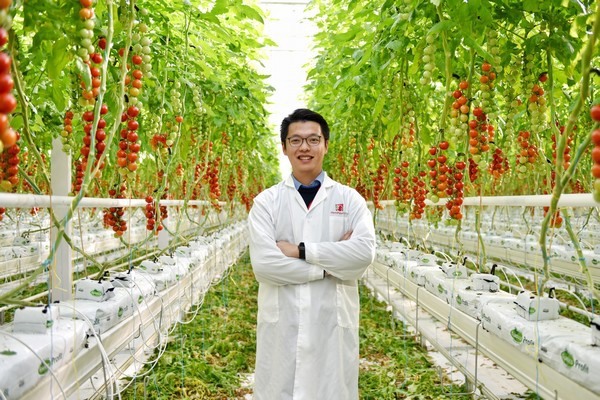
Dr. Xu Dan, CEO at HortiPolaris
The final speaker was Dr. Qiu Yutong, a specialist in sustainable insect pest management at the Plant Sciences Group at Wageningen University. Dr. Qiu has many years of experience at Wageningen University studying comprehensive pest control in the horticultural industry.
More recently she has been involved in coordination and development for cooperation between Chinese and Dutch companies in the horticultural industry and related fields. During the symposium Dr. Qiu discussed the mechanisms of technological innovation in the Dutch horticultural industry as well as the characteristics and advantages of industrial transformation through technology. Dr. Qiu provided a summary of several cooperative projects between Wageningen University and Chinese horticultural companies in need of innovative technology. One of the most important projects was concerned with the research and transformation of sustainable pest management technologies in the greenhouse industry.
Dr. Qiu analyzed the reasons why current measures in Chinese greenhouses are insufficient for sustainable control of insect pests and plant diseases. Some of the reasons are as follows: product quality deteriorates during transport; there is a lack of natural predators in a greenhouse environment; pest control methods and concepts are stuck at the level of pesticides, which is not only inefficient, but expensive as well; there is a lack of understanding about the ways in which pest control methods and pesticides can be organically integrated.
Dr. Qiu also introduced some case studies where the Chinese government worked together with private companies to make greenhouse installations more flexible and improve the impact of sunlight in greenhouses. Dr. Qiu also expressed hope that Wageningen University will continue to train technological personnel for the agricultural industry and focus on cooperation between Wageningen University and Chinese companies to solve pressing issues in the Chinese horticultural industry.
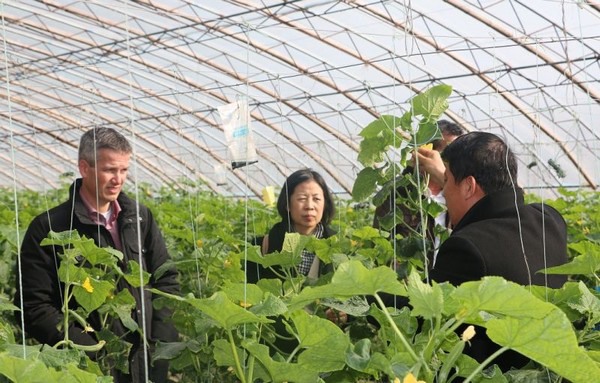
Dr. Qiu Yutong, a specialist in sustainable insect pest management at the Plant Sciences Group at Wageningen University
The presentations were followed by a Q&A round. Some of the discussion topics included practical problems in the greenhouse industry, directions for development in the training of horticultural personnel, quarantine measures for biological products, and ways to establish a cooperative in the Chinese greenhouse industry.
After the symposium ended, Dr. Huang Ruiqing said the following: "It can not be denied that the Chinese horticultural industry has great potential and there is a growing number of interconnected greenhouse plantations that produce top-quality fruit, vegetables, and flowers. However, there is still a gap of about 20-30 years between the Dutch horticultural industry and the Chinese horticultural industry. Many Chinese companies already import Dutch methods, but these can not reproduce an entire system in the short span of only a few years. Coming up with a development method for the Chinese horticultural industry and implementing this method takes a longer period. I suspect that the next 20-30 years will be a golden period for developments in the Chinese horticultural industry. And in this period there will be increasingly intense cooperation between China and the Netherlands.
"I hope the Wageningen University Alumni Chapter China will take advantage of this golden opportunity to bravely face the challenges we have discussed during this symposium and provide solutions both from a scientific research perspective and with attention to the practical implementation. Together we can establish a healthy system for the greenhouse industry in China. Together we can take our responsibility in society today!"
For more information:
Wageningen University Alumni Chapter China
Han Beizhong (President of the Wageningen University Alumni Chapter China)
Yan Jie (Secretary of the Wageningen University Alumni Chapter China)
E-mail: jie.yan@wur.nl
Tel.: +86 010-62118002
Symposium organizer: Li Tao (Board member of the Wageningen University Alumni Chapter China)
E-mail: litao06@caas.cn
